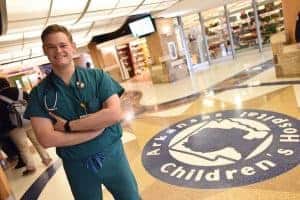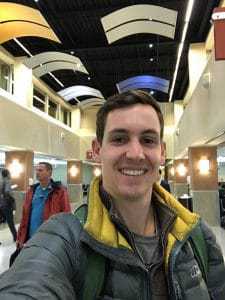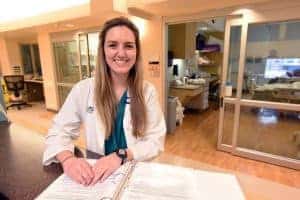Stories from the Road: Residency Interviews Lead to Match Day for UAMS College of Medicine Seniors
| Jan. 31, 2018 | As the arduous process of applying to residency programs winds down for this year’s seniors in the College of Medicine at the University of Arkansas for Medical Sciences (UAMS), one thing is clear: The road to Match Day is long – both figuratively and literally.
In the fall and winter of their senior year, medical students around the country juggle heavy travel and other demands of the increasingly competitive Residency Match on top of academic and clinical obligations back on campus.
Seniors face the daunting task of trying to determine which residency programs would be the best fit for them – including institutions and places they initially know little about. And they are painfully aware of national data that exhorts them to attain ample numbers of interviews in order to reasonably ensure that they successfully match.
It can be nerve-racking for any senior, including those who are likely to do well on March 16.
“Some days were just insane,” said Grant Cagle, who has served as his class president for all four years of medical school. The St. Louis native, who will graduate with both a medical degree and Master of Public Health, looks forward to training in internal medicine and a career focusing on socioeconomic disparities and health care for marginalized communities. “At the end of the day, I really enjoyed the interview process,” he said. “But it was also very stressful.”
Cagle and most of his classmates had applied to dozens of programs, heeding guidance from College of Medicine faculty as well as national experts. They had zig-zagged the country for a dozen or so interviews, sometimes driving or flying to multiple cities in a single week.
Cagle tracked it all on a master calendar and a detailed spreadsheet: where he had applied, the 13 places he interviewed, and his expenses. He scored each of the programs he visited in several areas reflecting his priorities, such as whether it had tracks relating to social justice in medicine, how well he meshed with the current residents he had met, and the location. The scores will help him finalize his ranked list of programs for the National Resident Matching Program (NRMP), which is due Feb. 21.

Barrett Burger, who will train in medicine-pediatrics, completes an anesthesiology elective at Arkansas Children’s Hospital in January.
Barrett Burger, a Camden, Arkansas, native who will train in internal medicine and pediatrics, applied to 38 programs and interviewed at 11. He squeezed four of his interviews into one eight-day stretch.
“I was on rounds at a program in the Midwest when I received an invitation to interview with a program on the East Coast the next week, so I stepped out and borrowed a computer at the nurses’ station to book a flight,” he recalled.
“The next day, I was making the 12-hour drive home when I got another invite to a program in the South for the day after the one I had just scheduled,” Burger said. “I pulled into a gas station and changed the flight that I had just booked, for some exorbitant fee.” Back at home, he packed another bag, flew to the East Coast interview, and then caught a flight to the program in the South, arriving with only minutes to spare. He rented a car for the journey home, packed yet another bag, and drove back to the Midwest for the fourth interview.

UAMS College of Medicine senior Sean Parham snaps a selfie at the Lexington, Kentucky, airport while traveling for interviews with residency programs in orthopaedic surgery.
“Looking back, it was exciting to visit a few places I had never been before and to meet a lot of great and unique people, and to continue pursuing my dream career,” Burger said. “I would also like to not ever do this again.”
“I can confidently say that this interview season has diminished how much I like flying,” said Sean Parham, a senior from Fort Smith, Arkansas, who is pursuing orthopaedic surgery. We first caught up with him as he was answering email at the airport in Dallas on his way to an interview in California. Just days later, he was traveling again for back-to-back interviews in Ohio and Kentucky.
Parham applied to 67 programs – not uncommon for applicants in the highly competitive specialty – and subsequently accepted invitations to interview at 13. Meanwhile, he was working in January with a general medicine team at the Central Arkansas Veterans Healthcare System. “Due to the maximum allowed number of days off to comply with rotation requirements, every day that I am not traveling for interviews, I’m working,” he said.
Shannon Petrus, a senior from Hazen, Arkansas, hopes to match to a residency in general surgery in the South. A drive between back-to-back interviews in Texas and Oklahoma was particularly memorable.
“I was in the middle of nowhere when my tire popped,” Petrus said. “That had never happened to me before, but I got through it and still made it to the interview dinner that evening on a ‘donut’ tire. I thought, this is going to be a good story to tell someday; but at the time it really stressed me out.”

With 12 interviews for general surgery residency programs behind her in January, Shannon Petrus works in the Surgical Intensive Care Unit at UAMS.
Like the flat tire, residency interviews caused only short-lived stress for Petrus.
“I was very nervous at first – shaky hands, shaky voice, and I couldn’t sleep the night before,” she said. “But after I got the first couple of interviews out of the way it became fun. You meet so many people and hear many life stories. As a future surgeon, it was so interesting to talk with experienced surgeons about how they chose their specialty and how they got where they are today.”
Then and Now
James Graham, M.D., a professor of pediatrics and associate dean for undergraduate medical education in the UAMS College of Medicine, sympathizes with today’s medical students. “When I was a graduating senior, in 1985, I interviewed at seven programs, and I almost canceled my last interview because I was so tired,” he said, laughing. “That’s only about half of what today’s students must do.”
“The Match is considerably more competitive overall than it was a decade or two ago, and students generally have to spend more time and more money interviewing at greater numbers of programs,” Graham said.
Contributing factors include the increasing numbers of graduates from allopathic medical schools and the growing number of students from osteopathic medical schools competing for positions through the NRMP, Graham said. “The total number of residency positions has also increased, but not to the same extent.”
While 1,059 U.S. medical school seniors failed to match in 2017, UAMS achieved its best match rate in a decade. Eight College of Medicine students initially failed to match, but all of them subsequently obtained a position during Match Week through the NRMP’s Supplemental Offer and Acceptance Program or the college’s Transitional Year Residency Program.
“It is very important to apply to enough programs, secure enough interviews, and rank enough programs on your match list,” Graham said.
In general, Graham and other academic leaders advise students to aim for 10-12 interviews. However, circumstances vary based on the specialty, the specific schools and programs a student is interested in, and the student’s own test scores and academic achievement. Faculty advisers within specialties can help individual students understand whether they would be a competitive candidate for a residency position.
Advisers and Advocates
The UAMS College of Medicine has introduced several initiatives in recent years to help students better prepare for the Match, including the Academic Houses established in 2016. Students have long been encouraged to choose a specialty-specific adviser in their junior year, and now every student also has a house-based general adviser who provides academic and career advising throughout medical school.
For the past few years, Sara Tariq, M.D., associate dean for undergraduate clinical education, has worked with a group of students to offer all seniors a residency prep series at the start of the year. Sessions focus on the Match process, strategies and communication skills. The series concludes with mock interviews with faculty volunteers. Over half of this year’s seniors and about 30 faculty members participated. Many other faculty members provide mock interviews for students who are pursuing their specialty.
“Our faculty members understand the heightened competition and challenging environment that our students face as they are applying for residency, and they have really stepped up to the plate,” Graham said. “They are making themselves available to students as well as participating in formal activities such as the mock interviews.”
Students are grateful for that dedication.
“Everyone in the Department of Surgery has gone above and beyond,” Petrus said, noting the advocacy of several faculty members including her mentor, assistant professor Katie Kimbrough, M.D. “Dr. Kimbrough has spent countless hours with me. She helped me organize my CV. We discussed programs I might apply to, and she helped me understand which ones were my ‘reach’ programs, which were more solid, and which ones I would almost certainly be invited to for an interview.”
Cagle’s mentor, Tariq, is an associate professor of medicine as well as the associate dean overseeing undergraduate clinical education. Cagle said Tariq helped him immensely when, with more than 50 internal medicine programs on his initial list for consideration early last fall, he wasn’t sure where to start.
“Dr. Tariq asked me what I wanted in a program, what things were most important,” Cagle said. “She helped me understand myself as an applicant and shared her insights about programs around the country. She helped me find my balance.”
Residency application and interview season will never be a walk in the park, but it is likely to be a little less stressful for College of Medicine seniors in the future.
This year’s juniors will start their senior year on June 1, a month earlier than seniors have in the past, thanks to a shift in the academic calendar and curriculum changes implemented over the past three years by the college’s curriculum committee and faculty members throughout the college.
“Our seniors will have an additional four weeks to finish all of their coursework, pass their licensure exams, and devote more time to the application process and residency interviews,” Graham said. “We wanted to make the process a little easier for them.”
